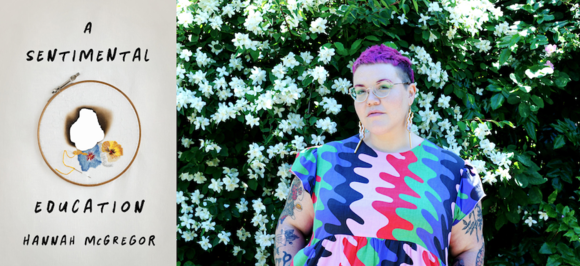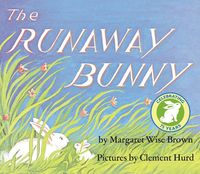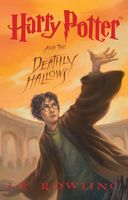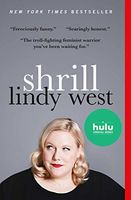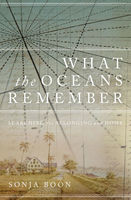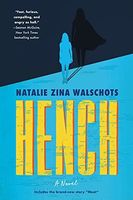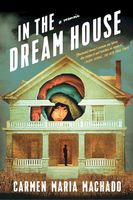Hannah McGregor on the Books That Shaped Her Writing and the One That Helped Her Break Genre Barriers
You can tell a lot about Hannah McGregor from the titles of her acclaimed podcasts, including Witch, Please and Secret Feminist Agenda. A writer and creator unafraid of a bit of cheeky fun with a serious subject, McGregor brings her academic prowess—McGregor holds a PhD and is an Associate Professor of Publishing at Simon Fraser University—to bear in accessible and inspiring ways. She previously co-edited the essay collection, Refuse: CanLit in Ruins and has now written a new hybrid work that marries memoir and theory, A Sentimental Education (Wilfrid Laurier University Press).
Asking questions about what feminist scholarship looks like as part of everyday life, from reading to mourning, A Sentimental Education begins with McGregor's own experiences and expands to invite readers to consider larger issues and pressures in feminist theory, about care and caregiving, bodies and space, the sentimental and the domestic.
At once funny, political, and personal, A Sentimental Education asks how we can live feminism in patriarchal systems, cultures, and academies, all while telling a true and absorbing story of one witty, thoughtful woman's life.
To celebrate the publication of A Sentimental Education, we asked Hannah to take us on a journey through the books that have shaped her as a reader and a writer as part of our WAR: Writers as Readers series.
She tells us about the book that plays an "almost spiritual role" in her life as a reader, the brilliant fat writer whose memoir she would have loved to give her 17-year old self, and the book that inspired her to let genre conventions and divisions fall away while writing A Sentimental Education.
The first book I remember reading on my own:
My favourite book as a child – the one I demanded my mother read to me over and over, until I could follow along by memory – was Margaret Wise Brown’s The Runaway Bunny. It’s not quite right to say it’s the first book I remember reading on my own, because it precedes both memory and reading, but it is the first book I remember, and still holds an almost spiritual role in my reading life as I return to it again and again, like a ritual to recall the safety of my mother’s love.
A book that made me cry:
Most of them, to be honest. I’m an enthusiastic reader of sentimental stories, and when I was younger my taste bordered on the maudlin. The most recent book that made me cry (in a tent, at that) was Harry Potter and the Deathly Hallows, which I just finished rereading for the seventh season of my podcast Witch, Please. My relationship with the Harry Potter series is complex: I actually didn’t read The Deathly Hallows until a few years ago, for the original run of Witch, Please, which means I don’t share the deep nostalgia of many millennials my age, plus my disdain for the author’s politics increasingly overshadows her work. But dang, that scene where Harry uses the resurrection stone to bring back his parents so they can comfort him as he goes off to die had me weeping. Maybe all my favourite books are dead-mom themed?
The book I would give my seventeen year old self, if I could:
I wish, so profoundly, that I had found fat politics as a younger person; it would have saved me years of self-loathing, disordered eating, and general misery at what I understood to be the fundamental failure of being fat. If I could, I would hop into a time machine and give my teenaged self Lindy West’s Shrill: Notes From a Loud Woman, a memoir of learning to embrace and celebrate fat bodies. And maybe I’d also give her Jess Fink’s graphic novel We Can Fix It! (look it up, this is a very funny joke).
A book I feel strongly influenced me as a writer and why:
In the middle of the writing process for A Sentimental Education, my editor sent me Sonja Boon’s What the Oceans Remember, a peer-reviewed scholarly book written as a memoir in which the author traces her family’s history through archives in Suriname, the Netherlands, the UK, and Canada. The book seamlessly brings together Boon’s scholarship with her life writing, telling a gorgeous story about the ongoing legacy of colonization while also exploring how archives shape what we do and do not know about history. Boon’s work totally transformed my understanding of what a scholarly book could be and do.
The best book I read in the past six months:
It’s a tie between Natalie Zina Walschots’ Hench and Micaiah Johnson’s The Space Between Worlds, both gifts from my friend Hilary who owns Iron Dog Books in Vancouver. Hilary is almost single-handedly responsible for re-sparking my childhood love of sci-fi and fantasy novels, which I put aside in grad school because I thought they made me seem like an unserious reader. I’m now obsessed with how feminist and queer sf uses speculative premises to tease out deeper truths about how power operates, how we define the limits of the human, and what possible futures we can build for ourselves.
Your CanLit News
Subscribe to Open Book’s newsletter to get local book events, literary content, writing tips, and more in your inbox
The commonly used literary trope that ruins a book for me:
I can’t stand when books casually use sexual violence as a plot device, the author lazily signalling the danger of a situation by threatening a woman. It happens in Harry Potter when the werewolf Fenrir Greyback keeps declaring his desire to eat teenage girls; it’s all over Game of Thrones, of course, but it also threads through Western literature, from Samuel Richardson’s Pamela to Stephanie Meyer’s Twilight, and I’m exhausted with how it normalizes sexual violence as a precondition of women simply existing in the world. Two thumbs down.
The commonly used literary trope I can always forgive:
I just never get tired of a clever bit of metafiction. It’s probably all the postmodern CanLit I read during my PhD (so let’s blame Robert Kroetsch and Daphne Marlatt and Timothy Findley) but I remain a sucker for a historical novel that is playing with the idea of history and what we can know about it. Contemporary examples like Carmen Maria Machado’s In the Dream House use metafiction to work through the unrepresentability of trauma and the way genres reshape lived experience into something else altogether, while Daniel M. Lavery’s uses metafictional devices in Something That May Shock and Discredit You to challenge readerly expectations about what a memoir of transition should be like.
A possible title for my autobiography:
Let’s go with A Sentimental Education.
_____________________________________________
Hannah McGregor is an Associate Professor of Publishing at Simon Fraser University. She is the host of the podcasts Secret Feminist Agenda and The SpokenWeb Podcast, and co-host of Witch, Please, a feminist podcast about the Harry Potter world. She also co-edited the book Refuse: CanLit in Ruins (Book*hug 2018).
